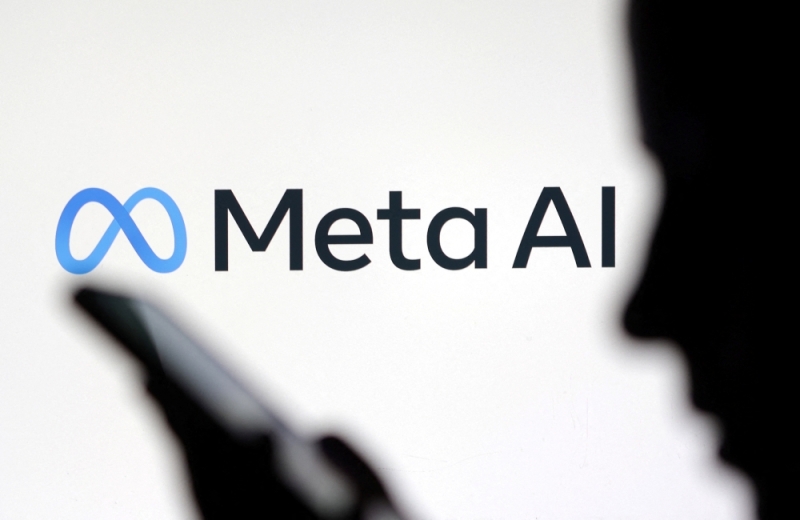
Meta’s chief technology officer is quick to push back on assertions that the company has fallen behind rivals like ChatGPT in the explosive surge across the tech industry in generative AI. — Reuters pic
MENLO PARK (United States), Oct 1 — Meta’s chief technology officer is quick to push back on assertions that the company has fallen behind rivals like ChatGPT in the explosive surge across the tech industry in generative AI.
“The majority of the world’s population will have their first experience of generative artificial intelligence with us,” Andrew “Boz” Bosworth told AFP at the company’s recent Connect conference for developers.
Meta unveiled AI-infused chatbots with personalities at the gathering, along with tools for creating images or written content using spoken prompts.
The company that owns Facebook and Instagram has been seen as lagging rivals like Microsoft and Google, which have pushed out generative AI products and invested heavily in the technology seen as a force poised to shape the future.
Bosworth was adamant that Meta is not behind, enhancing its global platforms with AI since before ChatGPT was launched to the public late last year.
“There are lots of cool tools, like Stable Diffusion, for generating images,” Bosworth said of the buzz around AI offerings from other companies.
But the executive was quick to point out that many of these new platforms take time and expert computer skills to master.
“We wanted the results to be great and fast, even on smartphones,” Bosworth said, noting Meta’s technology allows users to simply ask for an image of “hedgehog on a bike” or “happy birthday to a marathon runner,” for example.
Facts or Fabrications?
Meta for now has chosen the more cautious approach when it comes to generative AI.
Two weeks before the debut of ChatGPT in November 2022, Meta released a generative AI chatbot called “Galactica” that specialised in scientific research.
Galactica could write articles and solve math problems, but at times fabricated answers.
Meta quickly sidelined the tool, a move Bosworth told AFP he thought was a mistake.
“If it had been up to me, I would have left it,” Bosworth said.
“We had warned that our chatbot was capable of saying anything” and that users should proceed with that in mind.
AI products by Meta rivals meanwhile remained available despite the potential for bizarre answers referred to as “hallucinations” that brought the companies some ridicule.
But after years of controversy about content moderation at its world-leading social media platforms, Meta will likely err on the side of caution when it comes to setting safety parameters for its own creations.
As the other giants pushed out their AI products, Meta in the meantime improved its in-house AI model, releasing Llama 2 earlier this year as open source, meaning developers could tinker with it to create their own chatbots.
Metaverse
A Facebook employee since 2006, Bosworth recently led the division devoted to augmented and virtual reality innovations at the tech firm that was re-branded Meta.
Changing Facebook’s name in 2021 was billed as reflecting Zuckerberg’s belief in the metaverse being the next major computing platform.
Critics argued the move was actually part of a strategy to clean up its image after weathering accusations Facebook put profits over the safety and well-being of users.
And, while Meta has invested billions of dollars in its vision of the metaverse, it is far from being realized.
Bosworth conceded that adoption of Meta’s immersive social networking platform called Horizon Worlds had been slower than hoped, until recently.
“We should have had legs sooner,” Bosworth quipped in a reference to adding limbs to virtual world avatars.
At Connect, Meta spoke little of the metaverse and spotlighted products like Ray-Ban smart glasses that allow users to livestream what they see.
“Mixed reality” gadgets like its VR headset overlay digital content on what is around the user rather than immersing them completely in virtual realms.
The ability to transition from virtual reality to augmented was also added to new Quest 3 headsets that will be available in October.
People still won’t be able to see a Quest user’s eyes.
“We’ve tried it, the result can be quite off-putting,” Bosworth said, noting that building the headgear comes with trade-offs.
The tech world is eagerly waiting for Apple Vision Pro to hit the market early next year, with a hefty price tag of US$3,500 (RM16,433) compared to the Quest 3’s US$500.
“There’s nothing about that headset that we can’t build,” Bosworth said of Apple’s luxury-priced offering.
But Meta never thought that building something so expensive “was going to help our developers reach a big enough audience to be meaningful.” — AFP


